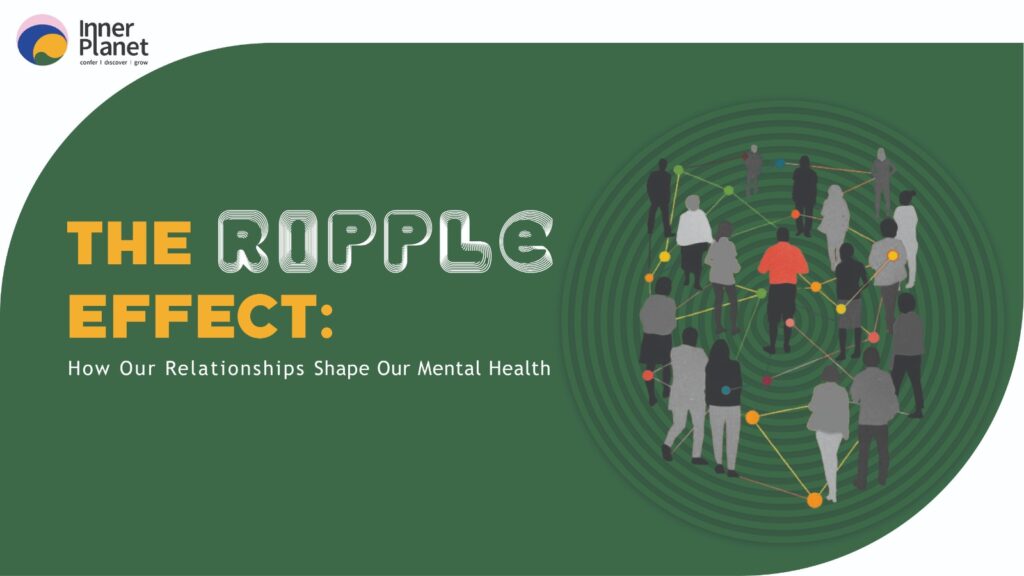The Ripple Effect: How Our Relationships Shape Our Mental Health

If your mental health is a garden, every connection you have can either serve as nourishing sunlight or a disruptive thunderstorm. From the roots of family relationships to the seasonal blooms of friendships and the strong branches of romantic partnerships, each bond influences the health of your emotional landscape. Research shows that these relationships can either help your mental well-being flourish or cause it to wither under stress.
We will explore how different types of relationships impact mental health. From the support of family to the complexities of professional dynamics, we’ll delve into the ways our connections shape our well-being. So, how do these relationships affect our mental health? Let’s find out!
Family Bonds:
A supportive family environment is foundational to building self-esteem and emotional resilience. Research highlights that secure attachment in childhood, formed through warm, responsive caregiving, plays a significant role in developing mental resilience. Children raised in nurturing environments are more likely to develop a positive self-image, which equips them to navigate life’s challenges effectively.
Conversely, family conflict can have long-lasting negative effects on mental health. Studies show that individuals who grew up in families marked by frequent conflict or a lack of emotional support are more likely to experience anxiety and depression in adulthood. For example, one study found that adolescents who perceived their families as unsupportive exhibited a higher likelihood of depressive symptoms, both at the time of the study and a year later. This highlights how early family dynamics can have a long-term impact on mental well-being.
Romantic Relationships
Romantic relationships can have diametrically opposite impacts on our mental health. Secure, loving relationships reduce stress levels and enhance emotional well-being by providing a sense of security and support. Research shows that individuals in stable relationships experience better overall health, including lower stress levels and improved cardiovascular health. For instance, simply holding the hand of a loving partner during stressful situations has been shown to calm neural activity in the brain, reducing both emotional and physical pain.
On the other hand, toxic or unstable romantic relationships can significantly harm mental health. Chronic stress in these relationships can lead to heightened levels of anxiety and depression. Emotional labor, where one partner consistently bears the emotional burden of the relationship, can also lead to burnout and feelings of resentment. Moreover, research underscores that individuals in unhealthy relationships are at a greater risk of developing physical health problems, such as cardiovascular disease and weakened immune function, due to chronic stress.
Friendships
Strong friendships act as a crucial buffer against stress and loneliness by providing emotional support, practical help, and a sense of belonging. Research shows that close friendships reduce anxiety and depression, with one study highlighting that having a confidant can mitigate the negative health effects of significant life stressors, such as the loss of a spouse.
Quality outweighs quantity when it comes to friendships. Relationships marked by security, intimacy, and reciprocity foster mental well-being, while strained friendships or social isolation can increase the risk of depression. For instance, individuals who experience low levels of intimacy with their friends tend to report higher levels of depressive symptoms.
Professional Relationships
Positive professional relationships, such as those with mentors or supportive supervisors, can significantly improve job satisfaction and personal growth. Research indicates that supportive work environments contribute to better mental and physical well-being. One study found that social support in the workplace acts as a buffer against stress, helping employees cope with the demands of their jobs.
Conversely, toxic workplace environments can lead to chronic stress, burnout, and even long-term health problems. When employees face low job control, constant criticism, or a lack of support, their stress levels remain elevated, triggering a sustained “fight or flight” response. This prolonged stress response can deplete emotional and physical resources, leading to anxiety, depression, and, in severe cases, burnout or conditions like PTSD.
Community Ties
Being involved in community groups or volunteering can enhance a sense of purpose and life satisfaction. Research shows that community involvement fosters social connections, which are essential for mental well-being. Participating in meaningful activities, such as volunteering, helps individuals feel they are contributing to something larger than themselves, boosting their sense of purpose and overall life satisfaction.
One study noted that people who actively engage in their communities experience higher levels of happiness and a stronger sense of belonging. Moreover, belonging to a community provides emotional support during challenging times, which can protect against feelings of isolation.
Social Media Connections

Social media has changed the way we connect, offering platforms for emotional support and community building. For example, for people suffering from rare or stigmatizing conditions, social media can be a lifeline, helping them find understanding and validation. These online connections can reduce feelings of isolation and provide emotional relief during difficult times.
However, social media also presents challenges, particularly with social comparison. The curated nature of feeds often showcases idealized lives, which can lead to feelings of inadequacy. Research shows that frequent exposure to these highlight reels can negatively affect self-esteem and contribute to feelings of discontent or depression.
To protect mental well-being, it can help to approach social media mindfully. Setting gradual boundaries, like taking breaks or balancing online interactions with offline connections, can make a difference. Focusing on meaningful engagement, whether by supporting others or sharing authentically, can turn social media into a positive force in your life.
The Self
Our relationship with our “self” is the first, and often the most important, piece of the puzzle. It is crucial for our mental health. Self-compassion, self-awareness, and self-care form the foundation of mental resilience. Research shows that individuals who practice self-compassion experience lower levels of anxiety and depression.
Cultivating a positive relationship with oneself is essential because it shapes how we respond to challenges and interact with others. Self-compassion, which involves treating ourselves with kindness and understanding, helps reduce the emotional impact of stressful events and builds emotional stability. This inner resilience allows us to navigate difficulties without being overwhelmed by self-criticism or doubt. Furthermore, research highlights that when we nurture a healthy relationship with ourselves, we are more likely to develop secure, fulfilling connections with others, as we approach relationships from a place of emotional strength rather than vulnerability.
Why Care?
Our mental health is deeply intertwined with the quality of our relationships. From family and friendships to romantic and professional connections, these bonds shape the environment in which we feel and function daily. By actively working on building and maintaining healthy relationships, we can create a strong support system that enhances our resilience, reduces stress, and improves overall life satisfaction—like an armored tank with emotional support missiles instead of ordnance.
Investing in relationships extends beyond emotional well-being; it contributes to physical health, happiness, and even longevity. Whether it’s through engaging in open communication, setting boundaries, or seeking help through therapy, the effort put into nurturing positive relationships is a gift to ourselves that keeps on giving.
Struggling to improve relationships is human. And while not all relationships can be improved through one-sided effort, remember that you don’t have to do it alone. Therapy, support groups, or simply reaching out to trusted friends can provide the guidance and encouragement needed to foster healthier connections. The better your relationships, the better your mental health will be—and the cycle continues!
References
-
- Lieberman, M. D. (2013). Social: Why Our Brains Are Wired to Connect. Crown Publishers.
- Nichols, M. P., & Davis, S. (2016). Family Therapy: Concepts and Methods (11th ed.). Pearson.
- Johnson, S. (2008). Hold Me Tight: Seven Conversations for a Lifetime of Love. Little, Brown Spark.
- Hojjat, M., & Moyer, A. (2017). The Psychology of Friendship. Oxford University Press.
- Pfeffer, J. (2018). Dying for a Paycheck: How Modern Management Harms Employee Health and Company Performance—and What We Can Do About It. Harper Business.
- Putnam, R. D. (2000). Bowling Alone: The Collapse and Revival of American Community. Simon & Schuster.
- Carr, N. (2010). The Shallows: What the Internet Is Doing to Our Brains. W. W. Norton & Company.
- Neff, K. (2011). Self-Compassion: The Proven Power of Being Kind to Yourself. HarperCollins.
- Christakis, N. A., & Fowler, J. H. (2009). Connected: The Surprising Power of Our Social Networks and How They Shape Our Lives. Little, Brown Spark.
- Aronson, E., & Aronson, J. (2018). The Social Animal (12th ed.). Worth Publishers.
- Gottman, J. M. (1999). The Seven Principles for Making Marriage Work. Three Rivers Press.
- Bella, K. M. J. (2023). Exploring the Impact of Workplace Relationships and Employee Job Satisfaction. International Journal of Scientific Research in Modern Science and Technology, 2(8), 55-62


